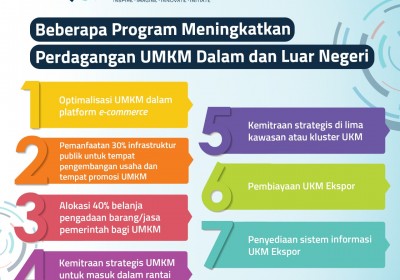KemenkopUKM Aiming for Tariff Reductions for UKM Fresh Fruit Exports
March 30, 2021
JAKARTA – The Small-to-Medium Scale Businesses (UKM) and Cooperatives Ministry (KemenkopUKM) hopes that Indonesian fresh fruit exports won’t be subjected to high tariffs abroad.
This is due to the fact that Indonesia’s exports of fresh fruit tend to be subjected to larger fees by markets such as Japan, South Korea, Pakistan and the European Union, compared to exports from other countries such as Vietnam, Malaysia, the Philippines and Kenya. In fact, some fruit exporting countries are not subjected to any tariffs at all. This fact decreases the competitiveness of Indonesian fruits in the global market.
These facts were revealed by the KemenkopUKM’s UKM affairs department head Harimba Rachman during the 2021 Indonesian Trade Forum meeting on Thursday (3/4).
For comparison, Indonesian pineapple exports to South Korea are subjected to a 30% export tariff while Vietnamese pineapple exports only receive an 18% tariff. Indonesian banana exports to Japan are subjected to tariffs of up to 10% to 20% while Philippine bananas only receive an 8% to 18% tariff, and Vietnam 10% to 18%. To address that challenge, Hanung added that Indonesia also needs to look at opening new markets to export fruit such as China, Australia, the United States and New Zealand.
“We are partnering with the Trade Ministry (Kementerian Perdagangan/Kemendag) to help boost our fresh fruit exports. The KemenkopUKM’s role in that partnership is to ensure the production of good-quality products as well as increasing product capacity,” he said.
Other initiatives run by the ministry include assistance programs to train leading UKMs, initiating partnerships between farmers and large-scale companies, factory sharing and developing the UKM supply chain.
“The Kemendag and other related institutions will provide proper information to UKMs on potential new markets and will also help through our tariff minimization agreements with other countries, holding trade exhibitions and easing the acquisition of permits,” Hanung added.
Improving domestic and international UKM trade will be done through several methods. These methods include encouraging UKMs to utilize e-commerce platforms to sell their products, as well as utilizing 30% of public infrastructure to become UKM development and promotion centers.
Also, the government will allocate 40% of its goods procurement budget to buy from local UKMs and will facilitate partnerships to assist UKMs in entering the industry supply chains.
“This also includes strategic partnerships with 5 UKM clusters to help finance and provide information on exports,” Hanung said.
Send us your ideas on how to improve the welfare of Indonesia’s UKMs through the Indonesia Development Forum’s social media pages!
Indonesia’s Research Institutions Supporting the Development of the Electric Vehicle Industry
Indonesian Muslim Fashion and Cosmetics IKMs Shine at Dubai World Expo 2020
Govt Steps Up UMKM Transformation Efforts in the Midst of Pandemic Slowdown
Govt Encourages Promotion of IKM Products in Digital Era
Government Begins Developing Maritime Training Center in Makassar
Tweets by IDDevForum
